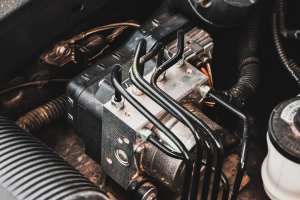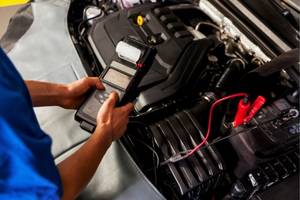Introduction
The Powertrain Control Module (PCM) is a vital component in modern vehicles, managing crucial engine and transmission functions. Replacing a Powertrain Control Module is often a significant repair, involving both cost and technical considerations. This blog will guide you through understanding what a PCM is, recognizing when it needs replacement, estimating costs, and finding a reliable mechanic. At SIA Electronics, we specialize in the re-manufacturing of automotive electronic control modules and ECUs, providing top-notch service for all domestic and foreign vehicles.
Table of Contents
What is a Powertrain Control Module (PCM) and What Does It Do?
Definition and Function: The Powertrain Control Module (PCM) is an onboard computer that manages the engine and transmission systems of a vehicle. It integrates the Engine Control Module (ECM) and Transmission Control Module (TCM) into a single unit. The PCM uses various sensors to monitor and optimize engine performance, fuel efficiency, and transmission operation.
- Engine Management: Controls fuel injection, ignition timing, and air-fuel mixture to ensure optimal engine performance and fuel efficiency.
- Transmission Control: Manages gear shifts and transmission fluid pressure for smooth and efficient driving.
- Diagnostics: Monitors vehicle performance and logs trouble codes for diagnostics, which are used to identify and address mechanical issues.
Importance: A functioning PCM is crucial for maintaining vehicle performance, fuel efficiency, and emissions standards. Any malfunction can lead to poor driving experience, increased fuel consumption, and potential damage to other vehicle components.
How Do I Know If My Powertrain Control Module Needs to Be Replaced?
Signs of PCM Failure:
- Check Engine Light: Persistent illumination of the check engine light may indicate a PCM issue.
- Poor Engine Performance: Symptoms like rough idling, stalling, or decreased power may suggest PCM problems.
- Transmission Issues: Hard shifting, slipping gears, or erratic transmission behavior can be related to a failing PCM.
- Increased Fuel Consumption: Unusual increases in fuel consumption could be due to PCM mismanagement of fuel delivery.
- Diagnostic Trouble Codes: If a diagnostic scan reveals codes related to engine or transmission control, it might point to a PCM failure.
Diagnostic Testing: Professional mechanics use diagnostic tools to test the PCM. They perform:
- OBD-II Scanning: To read trouble codes and determine if the PCM is malfunctioning.
- Visual Inspection: To check for physical damage or loose connections.
How Much Does It Cost to Replace a Powertrain Control Module?
Cost Breakdown:
- Parts: Replacing a PCM typically involves purchasing a new or remanufactured unit. Costs can range from $500 to $1,500, depending on the vehicle make and model.
- Labor: Installation costs can vary from $100 to $300, depending on the complexity of the job and labor rates in your area.
- Programming: PCM replacement often requires programming to ensure compatibility with your vehicle. This can add an additional $100 to $200 to the total cost.
Total Estimated Cost: On average, the total cost for replacing a powertrain control module can range from $700 to $2,000. Prices vary based on vehicle specifications and local repair shop rates.
Will Replacing the Powertrain Control Module Fix All My Vehicle's Issues?
Scope of Replacement: Replacing the PCM can resolve issues directly related to engine and transmission control. However, it may not address other underlying mechanical problems or issues related to sensors and wiring.
What It Fixes:
- Engine Performance Issues: If the PCM was causing poor engine performance, replacing it should improve drivability.
- Transmission Problems: If transmission issues were due to PCM faults, replacing it will often resolve these issues.
What It Doesn’t Fix:
- Mechanical Failures: Problems with the engine or transmission hardware will not be fixed by a PCM replacement.
- Sensor Issues: Faulty sensors or wiring issues may still need to be addressed separately.
How Can I Find a Reliable Mechanic for Powertrain Control Module Replacement?
Tips for Choosing a Mechanic:
- Experience and Expertise: Look for mechanics or repair shops with experience in PCM replacements and knowledge of your specific vehicle make and model.
- Certifications: Ensure the mechanic is ASE-certified or has equivalent qualifications.
- Reviews and Recommendations: Check customer reviews and seek recommendations from trusted sources.
- Warranty: Choose a shop that offers a warranty on both parts and labor to ensure peace of mind.
SIA Electronics Services: At SIA Electronics, we are an industry leader in the re-manufacturing of automotive electronic control modules and ECUs for all domestic and foreign vehicles. With over 20 years of experience, we provide high-quality parts and expert services to meet your automotive needs.
Conclusion
Replacing a powertrain control module is a crucial repair for maintaining your vehicle's performance and reliability. Understanding the role of the PCM, recognizing signs of failure, and knowing the costs involved can help you make informed decisions. By choosing a reliable mechanic and utilizing trusted services like those offered by SIA Electronics, you can ensure that your vehicle receives the best care and continues to perform optimally.
FAQs on
Powertrain Control Module Replacement : A Comprehensive Guide
-
1. What is a powertrain control module (PCM) and what does it do?
Ans.
A PCM is an onboard computer that manages engine and transmission functions. It ensures optimal performance by controlling fuel injection, ignition timing, gear shifts, and more.
-
2. How do I know if my powertrain control module needs to be replaced?
Ans.
Signs include a check engine light, poor engine performance, transmission issues, increased fuel consumption, and diagnostic trouble codes indicating PCM problems.
-
3. How much does it cost to replace a powertrain control module?
Ans.
The total cost ranges from $700 to $2,000, including parts, labor, and programming.
-
4. Will replacing the powertrain control module fix all my vehicle's issues?
Ans.
Replacing the PCM will address issues related to engine and transmission control but may not resolve other mechanical problems or sensor issues.
-
5. How can I find a reliable mechanic for powertrain control module replacement?
Ans.
Look for experienced, certified mechanics with good reviews and warranties on parts and labor.
-
6. Why choose SIA Electronics for PCM replacement?
Ans.
SIA Electronics is a leader in re-manufacturing automotive control modules with over 20 years of experience, offering high-quality parts and expert service for all vehicle types.



